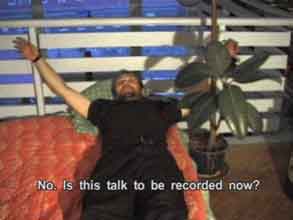She darts from behind the camera to join the picture, the mother with her son, both sitting in pyjamas on the sofa, indulging in horseplay, fondling each other. The boy who is about ten years old doesn't want to be kissed and hides his face in embarrassment. The scene shows the love between mother and son, but it also suggests a certain distance. These two people who love each other will never fathom each other completely. What at first seems to offer itself as a video document of a private moment gradually begins to touch on a basic fact of existence. From the formal point of view, Kai Kaljo's new work is fairly uncomplicated. The image quality suggests a simple camera, the framing looks a lot like an amateur video. Nonetheless the video is a well-balanced organic whole. Each part of this triptych has its own fixed camera position, each is kept in steady shot, the action is unified, and the domestic setting in real time is retained throughout (in part three the little boy is seen cuddling a house rat, but the rat always manages to struggle free from his affectionate hugging).
To the sound of a whiplash a graphic number 2 swishes onto the screen. Again the camera searches for the right frame and holds it without moving for the rest of the sequence. We don't see Kai in the second part, but we do hear her in voice-over. She has just handcuffed a man before the camera, his hands tied firmly to the banisters on a landing. She reproaches him for never having time, so now they can at last have a talk together. The man appears to have acquiesced in this treatment - Kaljo: "I've promised not to torture or kill you and not to show this in Estonia" - but he is suppressing his discomfort, not to say rage. From time to time he appeals to the camera for an explanation. The camera appears to be not so much a weapon as a means of underpinning the seriousness of the situation. As the scene unfolds we learn that the man abandoned the mother and son after twelve years. The viewer, who has been touched by the honesty of Kaljo's intentions, can hardly help sympathising with her aggressive act. But whatever reasons the man tries to give for his departure only serve to move them further apart. Two people who once loved each other have become strangers. 'Domestic Violence' is a arresting work on 'what's left when love is gone', on desire and on the impossibility of ever really knowing another person.
– Jellichje Reijnders
